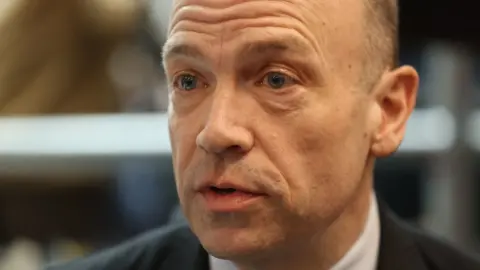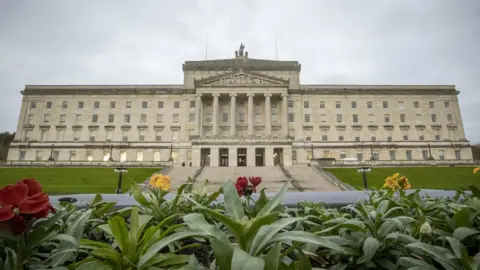Stormont crisis putting essential services at risk
 Getty Images
Getty ImagesEssential services in Northern Ireland are being put at risk by the lack of a Stormont budget, according to the heads of more than 50 public bodies.
Executive departments are expected to face big cuts to their spending in this financial year when the budget is set.
But the Public Sector Chairs' Forum said initial indications that the cuts could hit 20% were alarming.
It has written to Northern Ireland Secretary Chris Heaton-Harris, asking him for urgent clarity on the budget.
Mr Heaton-Harris is due to set the budget for Stormont departments in the absence of a functioning Northern Ireland Executive.
On Tuesday his spokesman said he hoped to be in a position to agree the budget "as soon as possible".
Roundtable discussion
BBC News NI understands that Stormont parties have been invited to a roundtable discussion with Mr Heaton-Harris on Thursday.
It is believed he plans to update them on governance for Northern Ireland in the absence of devolution, attempts to reform an executive and the upcoming 2023/24 budget.
Mr Heaton-Harris has refused to say if he will set a budget for Northern Ireland this week.
There had been speculation the Northern Ireland Office was preparing to produce it within days.
However, quizzed by MPs on the Northern Ireland Affairs committee, Mr Heaton-Harris said he would deliver it "as soon as I can".
Asked by SDLP MP Claire Hanna if that meant "days or weeks", he replied: "Never give a timeline to anything in Northern Ireland."
He added that it would be set "in very short order".
The Public Sector Chairs' Forum represents public bodies operating under all of Stormont's departments and includes the Education Authority and health and social care trusts.
Its chair, Nicole Lappin, said public bodies had never before been faced with such a significant budget crisis and were deeply concerned about the effect a major reduction would have.
"What [Mr Heaton-Harris] has given us are indicative allocations which indicate cuts of up to 20% across the public sector," she said.
"That is something that we cannot work with."
'Moral responsibility'
Stormont spends about £14bn a year, with the bulk of that going to health and education.
But the power-sharing government in Northern Ireland collapsed over a year ago after the Democratic Unionist Party (DUP) pulled out as part of its protest against post-Brexit trade rules.
It is expected that some departments will have their budgets cut by 10%, a situation that would be worsened by the high rate of inflation.
 PA Media
PA MediaThe Department of Education has already announced the end of several key services as a result of its tightening finances.
No construction work for new school buildings will take place this year, school holiday food payments for children entitled to free meals during term time have ended and a scheme providing free books for babies has been scrapped.
Lisa Wilson, from the Nevin Economic Research Institute thinktank, told Good Morning Ulster that the lack of a definitive budget had "effectively halted all but short-term decision-making" by civil servants, putting critical services at risk.
The effect of the budget cuts would be "unprecedented" and could be felt for years to come.
"All of those cuts will have an impact on the longer-term progress of the Northern Ireland economy."
She urged the UK government to help Stormont to "get its public finances on to a more sustainable footing".
'Collateral damage'
Her comments come two days after a former head of the Northern Ireland Civil Service said the forthcoming budgets cuts would be "undeliverable".
David Sterling described the spending crisis as "the worst that it has been".
"I think public services and departments are collateral damage in the struggle the government is having to get the institutions up and running again," he said.
 PA Media
PA MediaThe Northern Ireland Office said Mr Heaton-Harris had "worked intensively" with the civil service to prepare the budget.
But it added: "The secretary of state and Northern Ireland permanent secretaries should not be taking these decisions.
"It is time for Northern Ireland parties to get back to work and take the decisions for the people of Northern Ireland."
Jill Rutter, of the Institute for Government thinktank, said Mr Heaton-Harris was using the budget as a tactic to "pressurise the [Stormont] parties to get back into power-sharing".
She also said that civil servants were being put in an increasingly difficult position the longer they had to wait to find out how big the cuts would be.
"We're already well into the first month of the financial year - the more time you lose the harder it is to budget properly," said Ms Rutter.
"If you have to do things in a real rush... you may have consequences that you could have avoided if you'd been able to plan over a year.
"This year is going to be very difficult on public spending but it's a question of whether that's compounded by delay over what the financial budgets really are."
